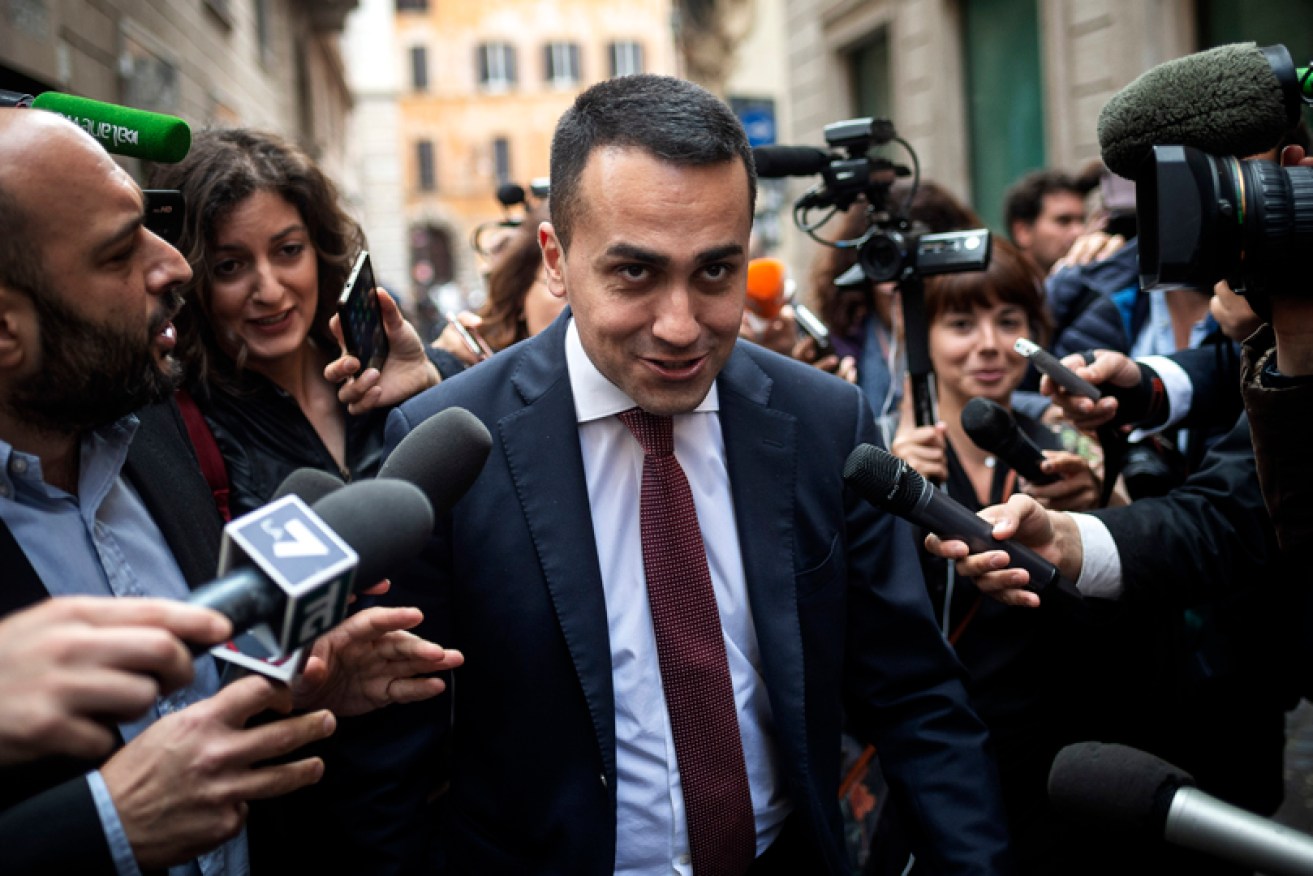Stunning developments in Italy send Brexit-like shockwaves around Europe


Luigi Di Maio, Leader of 5-Star Movement, speaks to the press. Photo: Getty
The rise of a populist government in Italy is sending shockwaves around Europe this week, raising fears the continent’s fourth-biggest economy could be on track for a Brexit-style retreat.
On Friday two stridently eurosceptic parties – the populist 5-Star Movement and the right-wing League – revealed they had reached an agreement and would form a coalition government on a radical platform.
The coalition’s policies include massive tax cuts, huge government spending programs and mass deportations of undocumented migrants.
These extremely expensive, anti-austerity policies, though popular with the Italian people, put the new government on a collision course with the European Union establishment.
This has drawn comparisons with the Greek crisis of 2015, when radical left-wing party Syriza won power and almost took the country out of the eurozone – before dramatically capitulating to Brussels’ demands.
While experts have downplayed the similarities with Greece, there are still fears the radical shift could see Italy’s debt spiral out of control, leading to a departure from the eurozone altogether – something both parties in the coalition have campaigned for.
The characters of the populist coalition
The 5-Star Movement – founded by comedian Beppe Grillo in 2009, and led by Luigi Di Maio – doesn’t fit neatly into any box, though it’s probably more to the left than the right.
The five stars stand for five priorities: public water, sustainable transport, sustainable development, right to internet access, and environmentalism.
The imposition of austerity policies from the European Union have made the 5-Star Movement hostile to the EU, and to the eurozone in particular.

M5S founder and comedian Beppe Grillo (left) with ‘movement’ leader Luigi di Maio. Photo: Getty
The League, led by Matteo Salvini, is broadly to the right, though it is also difficult to pin down. Often described as a ‘right-wing populist’ party, its roots are as a north Italian federalist (ie anti-centralist government) libertarian party.
The party is eurosceptic and anti-immigrant (including towards migrants from southern Italy), socially conservative, and supports low, flat rates of income tax. But to mix things up it is also environmentalist and has declared itself socialist.
Following a hung parliament in the March 2018 election, after two months of negotiation the two parties announced a coalition last Friday, and released a 58-page ‘contract’ laying out its policies.
They also named Giuseppe Conte, a law professor with no political experience, as prime minister of the coalition government.

Matteo Salvini, leader of ‘right-wing populist’ party The League. Photo: Getty
The coalition’s most radical policies include:
- guaranteed income for the poor of €780 ($1215) a month
- a flat personal income tax rate of 15 per cent and a corporation tax rate of 20 per cent
- spending more on pensions and reversing increases to the pension age
- lifting the limit on government borrowing, currently at 3 per cent of GDP
- deporting half a million undocumented migrants
All this will require huge spending, which, thanks to a massive reduction in tax revenue, would have to be funded by yet more borrowing. Italy is already the most indebted nation in Europe with a debt to GDP ratio of an eye-watering 132 per cent. The coalition says the policies will stimulate demand, which will help the country recover and repay its debt in the long-term.
This anti-austerity platform, along with the two parties’ consistent anti-Europe rhetoric, has got Italy’s European neighbours very nervous, and has sent Italian government bond yields skyrocketing – further increasing the government’s cost of borrowing.

Giuseppe Conte, the proposed new prime minister of Italy. Photo: Getty
The new coalition has responded by tempering its euroscepticism somewhat, but its attempt this week to appoint a noted eurosceptic as finance minister hasn’t helped.
What do Italians think?
While European elites may be watching in dismay, the Italian population appear to support the coalition. And given the dire economic circumstances of recent years, it’s not surprising.
The global financial crisis, and the eurozone debt crisis that followed, hit Italy particularly hard. Unemployment peaked at 13 per cent, up from a pre-crisis level of around 7 per cent. It is still at a very high 11 per cent.
Tax revenue plummeted as Italy entered two and a half years of recession. As a result, Italy had to borrow huge sum of money, pushing the public debt to its current sky-level against GDP.
In this video, Martin Wolf, the Financial Times’ highly respected economic commentator, describes the eurosceptic turn in Italy as a “stunning event” because Italy was traditionally the most pro-European country in the bloc.
However, given the economic stress over the last decade or so, he said it was “not surprising the Italians have become very jaundiced as a people”.
As yet the ‘populist’ program is not quite up and running, as the new government’s proposed cabinet must be signed off by the country’s president, Sergio Mattarella.








